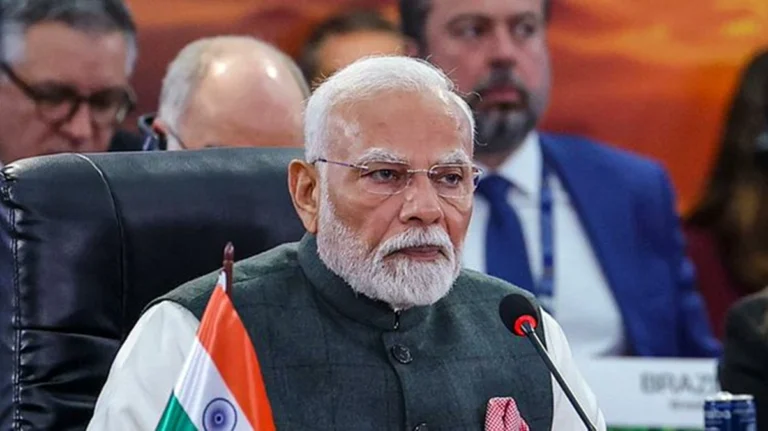Modi Urges BRICS to Unite on Critical Minerals and Strategic Technology Supply Chains

Indian PM Narendra Modi, July 7, 2025. Rio de Janeiro, Brazil. X/ @NewIndianXpress
July 7, 2025 Hour: 1:27 pm
The Indian Prime Minister also highlighted the role BRICS can play in achieving long-term development goals.
On Monday, Indian Prime Minister Narendra Modi urged BRICS nations to work together to ensure secure supply chains for critical minerals and strategic technologies.
RELATED:
China Condemns Trump’s Threat Against BRICS as ‘Arbitrary and Counterproductive’
Speaking at the BRICS Summit in Rio de Janeiro, Modi emphasized the importance of safeguarding essential resources such as lithium, nickel and graphite — key materials for sectors like electric vehicles, drones and energy storage.
“In addition to greater cooperation in critical minerals and technology, we must focus on securing and making their supply chains resilient. It must also be ensured that no country uses these resources solely for its own interests or as a weapon,” he said, in a clear reference to China’s restrictions on the export of strategic minerals.
Modi also addressed the growing debate over artificial intelligence, a topic gaining traction on the global agenda due to challenges involving ethics, bias and transparency.
“We must work towards responsible AI. We in India believe in AI as a tool to enhance human values and capabilities. Guided by the mantra of ‘AI for All,’ India is actively using AI in many sectors. We believe in AI governance,” he said, announcing that India will host the “AI Impact Summit” in 2026 as a multilateral forum to advance responsible AI governance.
Modi also highlighted the role BRICS can play in achieving long-term development goals, especially those related to food production.
“We can work together to fulfill specific expectations and aspirations nations of the Global South can have from BRICS. For example, the BRICS Agricultural Research Platform has been established in India, which can be a medium for sharing best practices in agri-biotech,” he said.
“The Global South has many expectations from us. To fulfill them, we must follow the principle of ‘Lead by Example.’ India is fully committed to working shoulder to shoulder with all partners to achieve our shared goals,” Modi said.
Today, BRICS represents 40% of global GDP, 49.5% of the world’s population and 26% of international trade. But beyond the numbers, what is at stake is its capacity to become a truly multipolar architecture, with sovereign, inclusive and sustainable proposals for a world in transition.
The consolidation of BRICS as a global actor reflects not only a shift in the economic and political center of gravity toward the Global South, but also the deepening crisis of the traditional international order dominated by the United States and its allies. However, internal tensions within the bloc could shape its future, geopolitical analyst Marcelo Ramirez warned in an interview with teleSUR.
Ramirez identified two main factions within BRICS. On one side, there is a “hard core” led by Russia, China and Iran, which advocates for a break from the current international system and a major overhaul of institutions such as the United Nations Security Council (UNSC), which is currently controlled by a small group of nations with veto power.
“Resolving these internal tensions and strategic approaches is the biggest challenge if BRICS is to truly become an alternative power bloc rather than just a rhetorical organization,” he said.
Opposing this view, Ramirez described a more “negotiating” BRICS, represented by Brazil and India, which supports gradual transformation and seeks to avoid direct confrontation with the West. “The idea of India managing the agenda causes some inertia… Brazil also slows down the group’s radicalization process,” he said.
India presents an ambiguous case, following a policy of renewed nonalignment: it maintains military ties with Russia while also cooperating with the United States and France on defense and technology. “India can be a friend of the West, of Russia or of China, depending on the sector in question,” Ramirez said, noting that this strategic flexibility complicates the formation of a BRICS unified foreign policy.
teleSUR/ JF
Sources: EFE – BRICS






